041216_YKBP_A13.pdf




Broadcaster Press 13
April 12, 2016 www.broadcasteronline.com
Car Care
Paint and Renovate Correctly
Changing paint colors
is one of the easiest and
least expensive ways to
add a fresh new look to
the interior or exterior
of a home.
Both exterior and interior paint can be used
to protect homes and
make strong impressions. Painting projects
are fun and can be easy,
but not all projects are
so simple. Homeowners
may need to exercise
patience and devote an
ample amount of time to
get the job done right.
One errant drip is all it
takes to turn a perfect
paint job into a colorful
mess.
While paints are
much safer now than
in years past, they still
need to be handled with
caution and disposed of
with care after the job is
done. Painting can be a
tricky project because
the fumes and chemicals
found in many paints
make these products
more difficult to dispose
of.
The Environmental
Protection Agency says homeowners in the United State throw out
64 million gallons of paint per year.
While latex paints are not considered
hazardous waste, they should be
recycled. Oil-based paints, however,
are considered hazardous household
waste (HHW) and must be disposed of
properly.
All homeowners should check
with their trash and recycling collection centers regarding the proper
way to dispose of paints, stains and
varnishes. ItÕs also possible to visit
Earth911.com and find a disposal
facility online.
nMetro Creative Connections
Treat
yourself.
We’ll help you
find that special
something.
Prevent Summer Sun and Heat Damage to Your Car
Come summertime,
people anticipate
spending plenty of time
outdoors enjoying the
warm weather and
taking in the scenery.
In addition to lazy days
spent at the beach or
around the pool, summer is a great season
for road trips and other
weekend getaways.
While many people look
forward to the sunshine
and heat of summer,
extreme weather can
be problematic for
vehicles.
The insurance quote
service Insuramatch
says the warmer season
can take its toll on car
paint and mechanical
components can bake
under the glaring sun
and heat. Furthermore,
temperatures can
quickly escalate inside
the vehicle, potentially
damaging upholstery
and anything else
inside.
Avoid the sun as
much as possible.
Protecting your vehicle
means keeping it out
of the heat and sunlight when it is not in
use. At home, park it
inside of the garage or
under a carport. When
shopping or running
errands, attempt to find
parking spaces in the
shade or in a covered
parking enclosure. Try
to run the bulk of your
errands during the early
morning or evening
hours when the sun will
not be as glaring.
Wax more often.
Try to wax your car after every wash. A good
layer of wax can protect
a vehicle’s paint from
dirt, debris and the
sun’s rays. Remember,
premium waxes do not
necessarily work any
better than less expensive waxes, but the type
of formulation (liquid,
paste and spray) may
affect application and
how long each application lasts. Consumer Reports found that paste
waxes are easier to
use than liquid waxes,
though liquid waxes
cleaned the best. Spray
waxes were the easiest to use and left the
fewest stains on plastic
parts, but they didn’t
last as long as other
waxes.
Clean out your stuff.
The heat can cause
items inside vehicles to
melt or explode. Depending on the product, a lot of staining or
damage can occur if
items melt or explode
inside a car. Wax-based
products can be particularly harmful. Be
wary of leaving lipstick,
crayons, candles, lip
balms, sunscreen, and
lotions inside vehicles
on hot days. In addition, remove canned
carbonated beverages
and other canned items
to reduce likelihood of
spills.
Use visors and car
covers. If you cannot keep your vehicle
parked in shady areas,
do what you can to
reduce direct heat and
sunlight exposure. Covers can protect against
UV rays and any sap or
bird droppings that may
fall on the vehicle. Place
reflective visors on the
windshield to redirect
sunlight so it doesn’t
turn the inside of the
car into an oven. Keeping the windows open
slightly also can keep
the air in cars fresh.
While drivers are protecting their cars, they
should also protect
themselves, passengers
and pets. Never leave
a person or animal
unattended in a hot car,
even for a short time.
nMetro Creative Connections
Did you know?
According to the popular website ThePeopleHistory.com, the average price for
a new car in 1986 was $9,255. While figures for 2016 have yet to be determined, in
September 2015, the automotive resource Kelley Blue Book (www.kbb.com) reported
that the average transaction price for light vehicles in August 2015 was $33,543.
Those figures should raise eyebrows among consumers, as they illustrate just how
much more expensive new cars have become over the last three decades. The U.S.
Bureau of Labor Statistics Consumer Price Index inflation calculator indicates that
$9,255 in 1986 had the same buying power as $20,041.47 in 2015, leaving consumers
in 2015 well short of the necessary funds needed to purchase new vehicles. If
new vehicle buyers in 1986 were faced with similar average car costs as buyers in
2015 faced, they would have needed $15,489.91 to drive a new car home from the
dealership.
nMetro Creative Connections
from windows to flooring
Brunick Furniture has you covered!
Buy One Blind
at Regular Price
and
get 2nd one
1/2 off
• Free In-Home
Consultation &
Estimates
• Free Installation
• 0% Financing
Available
• Cellular & Pleaded
Shades
• Paneltrac Sliding
Blinds
• Roman Shades • Vertical Blinds
• Wood & Metal Blinds
Brunick
FURNITURE & FLOORING
All Carpet on Sale ~
• Free Estimates • Professional Installation
• 0% Financing Available
1100 W. Cherry
Vermillion SD• 605-624-8688
Mon - Fri 9:00 - 5:30
Sat 9:00 - 3:00

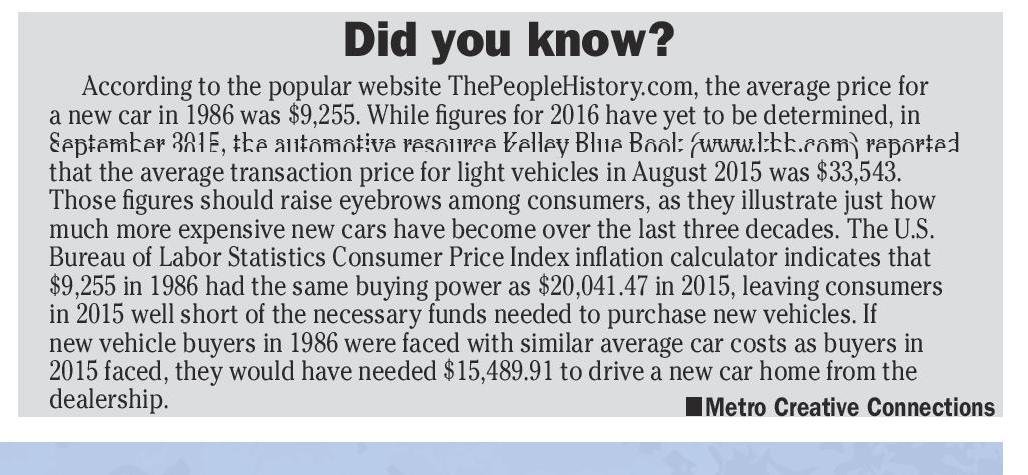
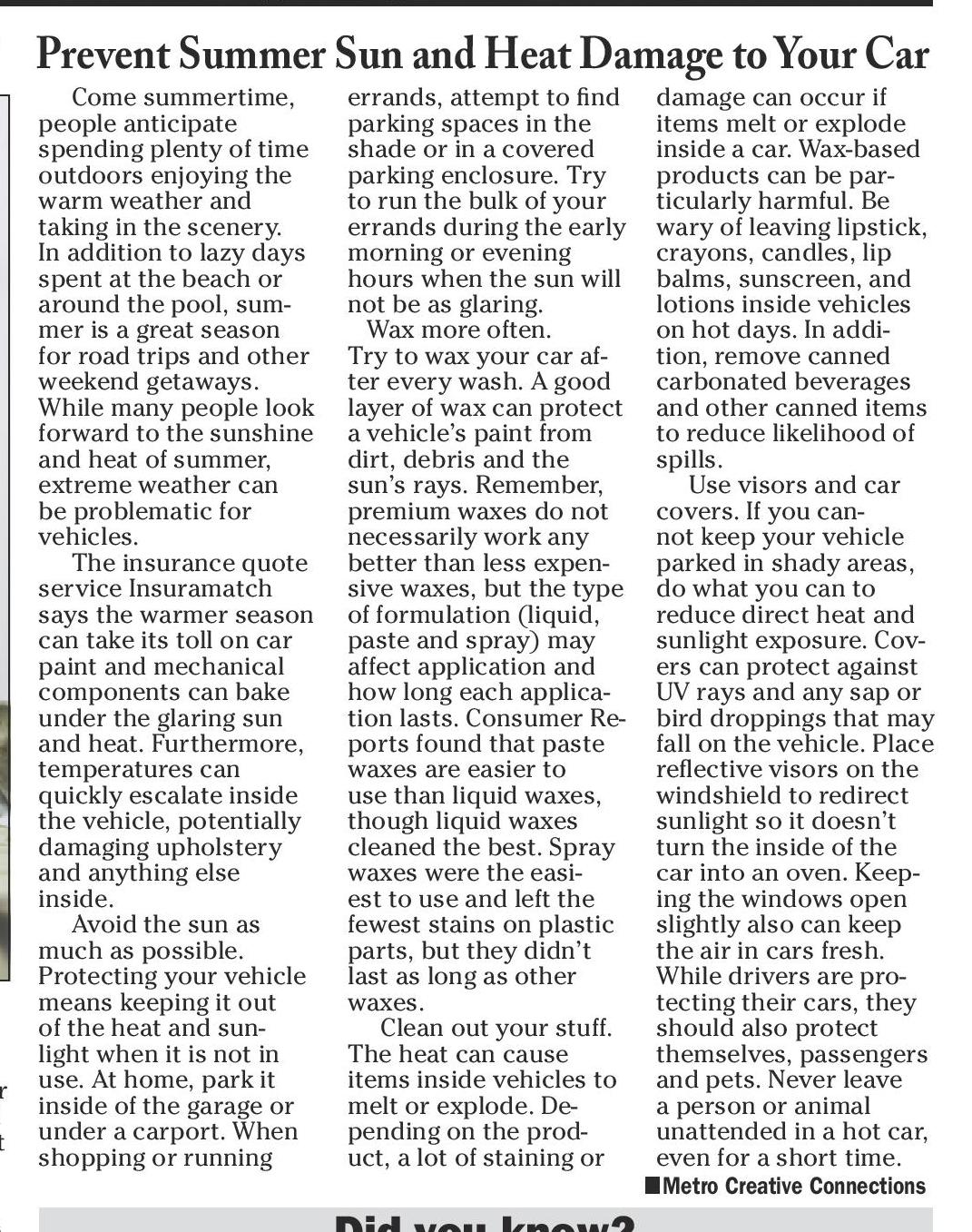
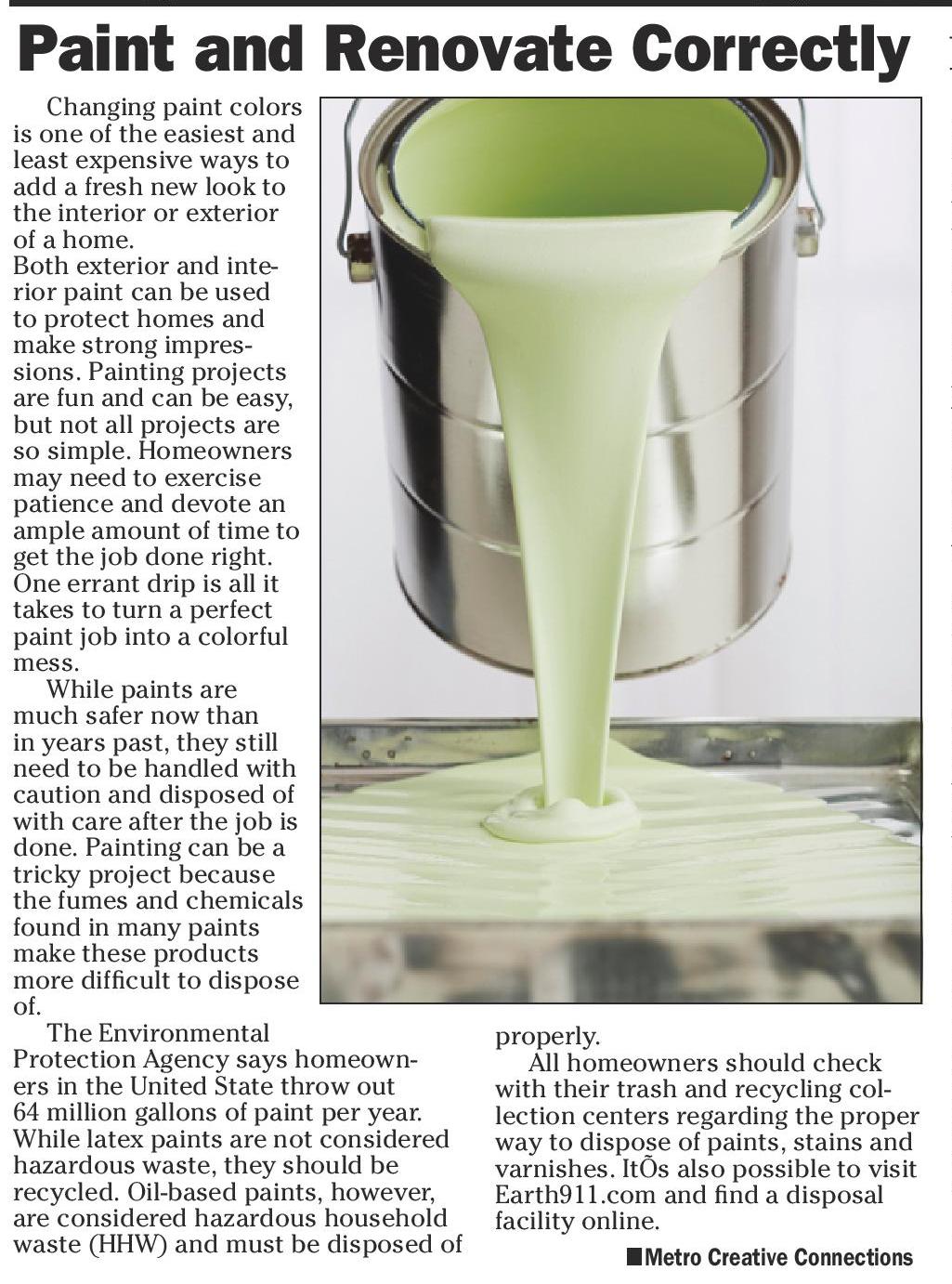




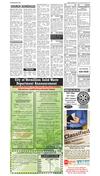


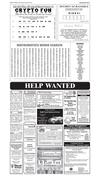
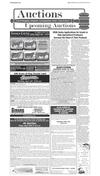
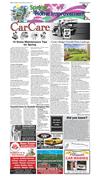
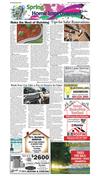
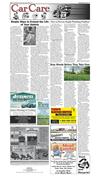

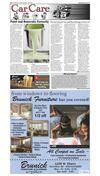
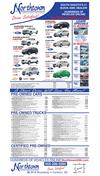
 Previous Page
Previous Page






